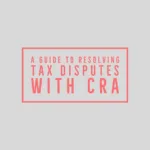Navigating the Appeals Process in Canada CRA: A Guide to the Courts
If you find yourself in disagreement with the Canada Revenue Agency (CRA) over a tax-related matter, understanding your rights and options for appeal is essential. This guide outlines the steps to take when considering an appeal to the courts in Canada.
Types of Objections and Appeals: Before delving into the court appeals process, it’s crucial to explore the various types of objections and appeals available. The CRA provides detailed information on this topic. You can visit the official CRA website at canada.ca/cra-objections-appeals, select “File an objection,” and then navigate to “Types of objections” for comprehensive guidance.
Appealing to the Tax Court of Canada: If you disagree with the CRA’s decision on your objection, the next step is to appeal to the Tax Court of Canada. This court operates independently and holds regular hearings across the country. Here are key details to keep in mind:
- Time Limit: Your notice of appeal must reach the Tax Court of Canada within 90 days from the date you receive the CRA’s decision, whether it’s a notice of reassessment or confirmation. You can also appeal if the CRA hasn’t responded to your objection within 90 days of your filing.
- Learn More: For a deeper understanding of the appeal process at the Tax Court of Canada, consult canada.ca/cra-publication-rc4443-2 or visit canada.ca/cra-appeals-court.
Appealing to the Federal Court of Appeal: In certain cases, you may wish to appeal a judgment from the Tax Court of Canada. To do so, you must file your appeal within 30 days of receiving the final judgment from the Tax Court. Note that the months of July and August are excluded from the 30-day calculation. The Federal Courts Act outlines specific grounds for appeals in cases heard under the Informal Procedure by the Tax Court.
For comprehensive information on appeals to the Federal Court of Appeal, visit canada.ca/federal-court.
Appealing to the Supreme Court of Canada: To appeal a judgment from the Federal Court of Appeal to the Supreme Court of Canada, you must first request the Supreme Court’s permission. This request, known as an application for leave to appeal, must be filed within 60 days of the Federal Court of Appeal’s judgment. Please note that the month of July is excluded from the 60-day calculation.
For detailed instructions and insights into the Supreme Court of Canada’s appeal process, visit www.scc-csc.ca.
Disputed Amounts and Collection Procedures: When you file an objection, the CRA typically postpones collection actions on disputed amounts until 90 days after issuing a decision. However, some situations, such as taxes withheld and remitted or amounts in jeopardy, may not qualify for this postponement.
It’s essential to know that interest charges often continue to apply to disputed amounts. Paying part or all of the total amount in dispute can help reduce the interest charged.
If you choose to appeal to the Tax Court of Canada, collection actions on disputed amounts will generally remain on hold until the Court issues its decision or you withdraw your appeal. If you lose your appeal, the CRA will resume collection actions, but they may accept security for payment while your appeal is ongoing.
For more in-depth information on collection policies, explore IC98-1R8, Tax Collections policies on the CRA’s official website.
Understanding the appeal process and your options for recourse can provide clarity and peace of mind when dealing with tax-related disputes in Canada. Be sure to consult the relevant resources provided here for detailed guidance on each stage of the appeals journey.

 Previous Post
Previous Post Next Post
Next Post